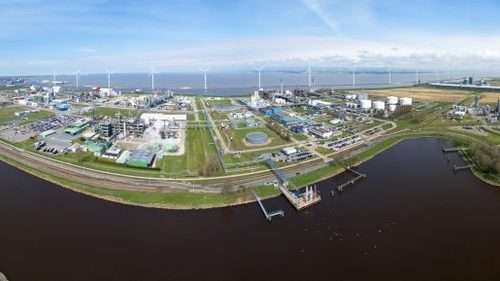
Chemical technology company Avantium has partnered with AkzoNobel, Chemport Europe, RWE, and Staatsbosbeheer to develop a reference plant at the Chemie Park Delfzijl in the Netherlands. The plant will use Avantium's Zambezi process to convert non-food biomass into high-purity glucose, which can be used to produce biobased chemicals and materials. The lignin residue from the process will be used for renewable energy generation. The partners aim to enable cost-competitive production and accelerate the rollout of the biobased economy. The reference plant will have an expansion-ready footprint to allow for rapid capacity increase.
Amsterdam – Avantium, a leading chemical technology company and forerunner in renewable chemistry, announces a partnership with AkzoNobel, Chemport Europe, RWE and Staatsbosbeheer for the development of a reference plant at the Chemie Park Delfzijl. This important step marks the next stage of a collaborative effort to determine the feasibility of a wood to chemicals biorefinery in Delfzijl.
Breakthrough technology: the Zambezi process
The new reference plant in Delfzijl will be based on a new technology that has been developed by Avantium. This Zambezi process aims for a cost-effective process for the production of high-purity glucose from non-food biomass such as forestry residue, pulp or agricultural by-products, so called second generation feedstock. This breakthrough technology converts woody biomass into sugars and lignin. It is particularly suited for making high purity glucose required for the production of a wide range of biobased chemicals and materials for the chemical industry of tomorrow. This glucose is suitable for both catalytic and fermentation processes for the production of a new and growing generation of sustainable materials (such as PLA, PEF, PBAT, PHA). The lignin is an excellent feedstock for renewable bioenergy applications, as its energy content is significantly higher than that of woody biomass.
Partnership of strengths
Each partner brings their core strength to the project; from feedstock, throughout the supply chain to end products. The main feedstock of the plant will be locally sourced forestry residue coordinated by Staatsbosbeheer. The planned reference plant builds on the strong synergies of the infrastructure, utilities and expertise of the AkzoNobel site in Delfzijl. RWE will supply feedstock and use bio-lignin residue from the Zambezi process for the generation of renewable energy. Chemport Europe brings strategic support from the Northern Netherlands Region working via a range of initiatives to facilitate the project. Further synergistic pa rtnerships and collaborations are currently under development.
The partnership expects, together with the geographical, technical and logistical benefits of the Delfzijl area, to enable the cost competitive production that will help accelerate the roll out of the biobased economy. The reference plant will be constructed with an expansion-ready footprint enabling rapid increase of capacity after demonstration.
About RWE Generation NL
RWE Generation is a pan-European energy company with one of the largest power portfolios in the world, with over 40 GW of generating capacity. The company is a wholly-owned subsidiary of RWE AG. RWE Generation brings together the international expertise and experience of RWE Generation NL, RWE Generation UK and RWE Power to form one company which provides our clients with power 24/7. In the coming years, RWE Generation NL will transform its coal fired power plants in the Netherlands to supply sustainable heat and power. With these transformations, RWE Generation NL will significantly contribute to the energy transition in the Netherlands.
The power plant Eemshaven has been granted SDE+ subsidies for 15% sustainable biomass, already, and the Amer power plant will replace 80% of the coal input by sustainable biomass.
About Staatsbosbeheer
Staatsbosbeheer is committed to its continuing development as a vital public enterprise and to strengthening the position of nature in the Netherlands. As a leading national public body, our focus continues to be directed towards enhancing the green heritage of our country. As land owner and manager of 265,000 hectares of forests and national parks across the Netherlands’ 12 provinces, Staatsbosbeheer contributes in essential ways to the realization of national priorities – these include, water safety strategies along the coast and large river systems, wood and biomass production, environmental education and outreach, supply of clean drinking water, regional economic development and social cohesion.